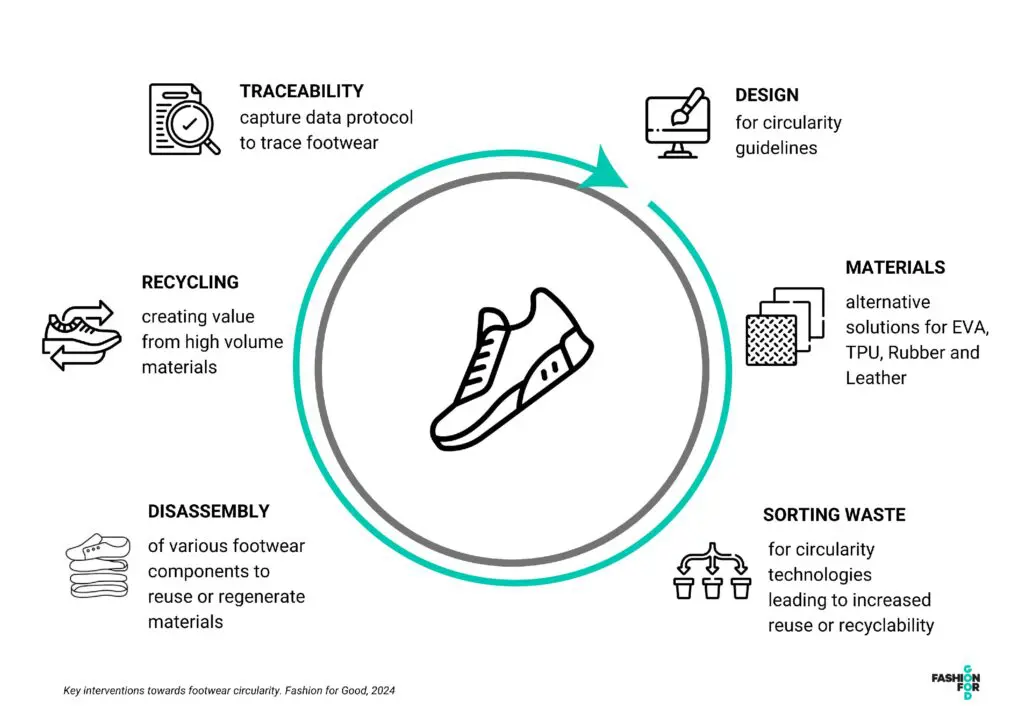Fashion for Good and its footwear focused partners adidas, Inditex, ON Running, PVH Corp., Reformation, Target, and Zalando announce an ambitious new initiative aimed at accelerating and validating the next generation of footwear innovations. This builds on the organisation’s existing work leveraging their expertise in scouting, validation, and pioneering innovation and collaboration.
This initiative will address the key intervention points needed to drive footwear circularity spanning four work streams across the supply chain from materials to end of use. Industry wide collaboration will be vital to overcome the various roadblocks we face in this space. Therefore, Fashion for Good is launching a call for action, asking all relevant innovators to apply and collaborators to join in the movement.
Tackling The Footwear Complexity Challenge
Around 23.9Bn shoes are produced globally each year, they are often made using over 40 different components from a range of different materials including TPU, EVA, PU and rubber. The industry faces significant challenges due to this high complexity of shoe construction. This combined with a low collection rate, results in a vast majority of discarded footwear ending up in landfills. Fashion for Good sees the need to address this challenge and focus on laying the foundation for footwear circularity as well as accelerating innovation.
Therefore, Fashion for Good will double down their work in this space, building on their existing projects including the Fast Feet Grinded pilot, which tests and validates Fast Feet Grinded’s footwear recycling process. Expanding on existing workstreams Fashion for Good will collaborate with our footwear focused partners, including adidas, Inditex, ON Running, PVH Corp., Reformation, Target, and Zalando.
Four Core Workstreams
To effectively address the challenges in footwear sustainability, Fashion for Good has identified the key intervention points across the shoe lifecycle and structured work into four core workstreams.

These workstreams include:
1. Design – Defining circular design in the footwear space and collectively driving guidelines to build a circular infrastructure
2. Materials – Scouting and validating sustainable alternatives for footwear materials including TPU, PU, EVA, leather, and rubber
3. End of Use: Sorting, Disassembly, & Recycling – Developing a comprehensive data set on post-consumer footwear waste flows, including (non-)rewearable fractions, volumes, construction and composition. As well as scouting and validating solutions for repair, end of use, disassembly and recycling of footwear
4. Traceability – Laying the foundation by amalgamating a footwear traceability data protocol to build traceability for evidence to substantiate sustainability claims
This initiative will leverage Fashion for Good’s extensive experience in orchestrating multi stakeholder projects as well as driving innovation pipeline and validation work. Collaboration with ecosystem partners, including The Footwear Collective will align efforts to achieve impactful results.
“Fashion for Good and our corporate partners, including adidas, recognize the urgent need to accelerate innovation in footwear sustainability. Over the past seven years, we have consistently broken norms across various segments and are now leveraging our expertise to radically reimagine footwear. By doubling down on our efforts, we aim to drive circularity and validate sustainable solutions in a segment ripe for disruption.” – Katrin Ley, Managing Director, Fashion for Good
“adidas has been a partner of Fashion for Good for over six years now. Through this partnership, we have collaborated on a number of different sustainable innovation initiatives that are benefitting the fashion industry. Now we want to build on this know-how and expand our focus into the Footwear space. Currently, there is a limited portfolio of low-impact materials which also meet the necessary performance requirements that are also scalable. We hope this initiative will help overcome some of these hurdles” – Sigrid Buehrle, SVP Product Operations and Sustainability, adidas































